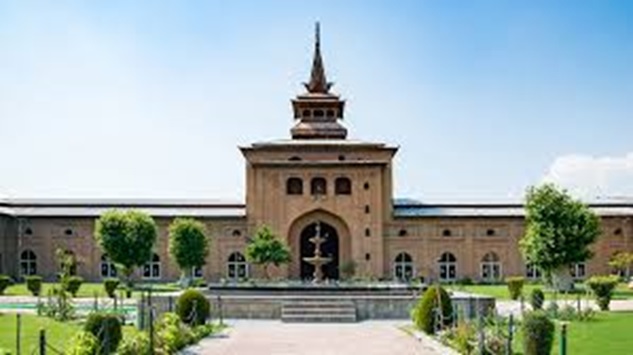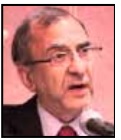
Closure of Jamia Masjid Srinagar on Eid Is Condemnable
By Dr Ghulam Nabi Fai
Chairman
World Forum for Peace & Justice
Washington, DC

The Universal Declaration of Human Rights stipulates in Article 18: "Everyone has the right of freedom of thought, conscience, and religion.” And Article 18 of the International Covent of Civil and Political and Rights (ICCPR) establishes a non-derogable right of everyone to have or adopt a religion or belief of their choice, and to manifest their religion or belief in worship, observance, practice, and teaching. Paragraph 2 of the same article prohibits any coercion that would impair anyone’s freedom to have or adopt a religion or belief of their choice.
Freedom of religion is also celebrated in a host of United Nations human rights covenants. On November 25, 1981, the United Nations General Assembly proclaimed a Declaration on the Elimination of All Forms of Intolerance and of Discrimination Based on Religion or Belief. Article 3 specifically avows that "Discrimination between human beings on the grounds of religion or belief constitutes an affront to human dignity and a disavowal of the principles of the Charter of the United Nations, and shall be condemned as a violation of human rights and fundamental freedoms proclaimed in the Universal Declaration of Human Rights and enunciated in detail in the International Covenants on Human Rights, and as an obstacle to friendly and peaceful relations between nations."
Protection of religious liberty was enshrined in the Free Exercise Clause of the United States Bill of Rights. It has served as a beacon for other human rights covenants or promises. In his Four Freedoms Message to Congress on January 6, 1941, President Franklin D. Roosevelt declared that the second "is freedom of every person to worship God in his own way everywhere in the world."
In 1998, the United States Congress enacted the International Religious Freedom Act and found that "The right to freedom of religion is under renewed and in some cases, increasing assault in many countries around the world. More than one-half of the world's population lives under regimes that severely restrict or prohibit the freedom of their citizens to study, believe, observe, and practice the religious faith of their choice. Religious believers suffer both government-sponsored and government-tolerated violations of their rights to religious freedom." The Act establishes within the Department of State an Office on International Religious Freedom headed by an Ambassador at Large appointed by the President with the advice and consent of the Senate.
I do not wish to disparage the general utility of these pronouncements in protecting freedom of religion, but they are more like musical pitch than specific libretto, which serves as a reference point for tuning but allows for interpretation and variation.
All this is overtured to surveying freedom of religion in India, including Indian-occupied Kashmir. I would submit the following to show clear violations
It is reported that on June 7, 2025, restrictions were imposed by the Indian Government on the Eid al-Adha prayers at Jama Masjid and Eid Gah Srinagar and Mirwaiz Umar Farooq, the Chief Imam of Kashmir was not allowed to lead the Salatul Eid at Jama Masjid. As we all know Eid al-Adha is one of the two most important festivals in Islam. It is celebrated by Muslims around the world to commemorate the Prophet Ibrahim's unwavering faith and willingness to sacrifice his son, Ishmael, as an act of obedience to Allah. This marks the seventh consecutive year that Eid prayers were prohibited at Jama Masjid, following the revocation of Article 370 & 35 A in 2019.
Mirwaiz Umar Farooq wrote on X that “Eid Mubarak! Yet again, Kashmir wakes up to the sad reality: no Eid prayers at Eidgah, and Jama Masjid locked down — for the 7th straight year. I too have been detained at my home. In a Muslim-majority region, Muslims are deprived of their fundamental right to pray — even on their most important religious occasion celebrated across the world. What a shame on those who rule over us, and on those elected by the people who choose to remain silent as our rights are trampled over, again and again.”
APHC spokesperson Advocate Abdul Rashid Minhas, in a statement in Srinagar, strongly condemned the ban, calling it yet another violation of basic human rights by a regime that falsely claims to be the world’s largest democracy. He said India has not only stripped Kashmiris of their political freedoms but also trampled upon their religious liberties. Minhas stated that Kashmiris are being subjected to collective punishment simply for demanding their right to self-determination.
India aims to frustrate a full examination of religious persecution in Kashmir by denying unfettered access to the United Nations Thematic Rapporteurs and human rights organizations.
India's record of religious persecution is ecumenical. Amnesty International has documented concerns about restrictions on religious activities in Jammu and Kashmir. Based on their reports, these restrictions include closure of mosques and banning of religious festivals. The Indian government has been accused of systematically closing mosques and banning religious festivals in Kashmir.
House arrest of religious leaders: Prominent religious figures, such as Mirwaiz Umar Farooq, have been placed under house arrest. Kashmiri civilians, including political and religious figures, are routinely arrested under laws like the Public Safety Act (PSA), which allows for detention without trial.
Amnesty International views these restrictions as part of a broader campaign to suppress Kashmiri Muslim identity and a violation of fundamental human rights, including the right to practice one's religion freely. They have called on the global community to stand with the people of Kashmir and hold the Indian government accountable for these actions.
Human rights violations in Kashmir are intentionally aggravated by the Indian oppressors. Consider rape. During crackdowns against the civilian Muslim population, men are separated from women in whole villages, and relatives of rape victims are compelled to witness the barbaric human rights crime for the sole purpose of humiliation. Muslims have been targeted for their religious creed. Rapes by the Indian military are conspicuously absent in the separatist wars in Assam, Tamil Nadu and the Punjab.
To make the exercise of a fundamental human right a crime as India has done in Kashmir makes a mockery of the entire international human rights enterprise and should provoke universal condemnation by the democratic comity of nations.
I believe India's religious wars are too often overlooked because she is a nuclear power and an attractive economic market. India's flaws are characteristically drowned out by the emollient slogan, "The world's largest democracy," and “The land of Gandhi.”
The time has come to shine a bright light on India's unrelenting persecution of Muslims in Kashmir and of other religions throughout its territory. There is only one word that fairly describes a human rights campaign on behalf of religious freedom that blinks when a nuclear power is scrutinized: bankrupt.
We would strongly urge Dr Nazila Ghanea, Professor of International Human Rights Law at the University of Oxford and the United Nations Special Rapporteur on Freedom of Religion and Belief to seek permission to make an on-site uncompromised investigation, not a staged visit to Potemkin villages. A denial of free access by the Government of India would speak volumes about its persecutions. She should assess the situation and report back to the forthcoming session of the United Nations Human Rights Council that begins on June 16, 2025, and ends July 9, 20205 in Geneva, Switzerland.
(Dr Fai is also the Secretary General, World Kashmir Awareness Forum. - gnfai2003@yahoo.com)

